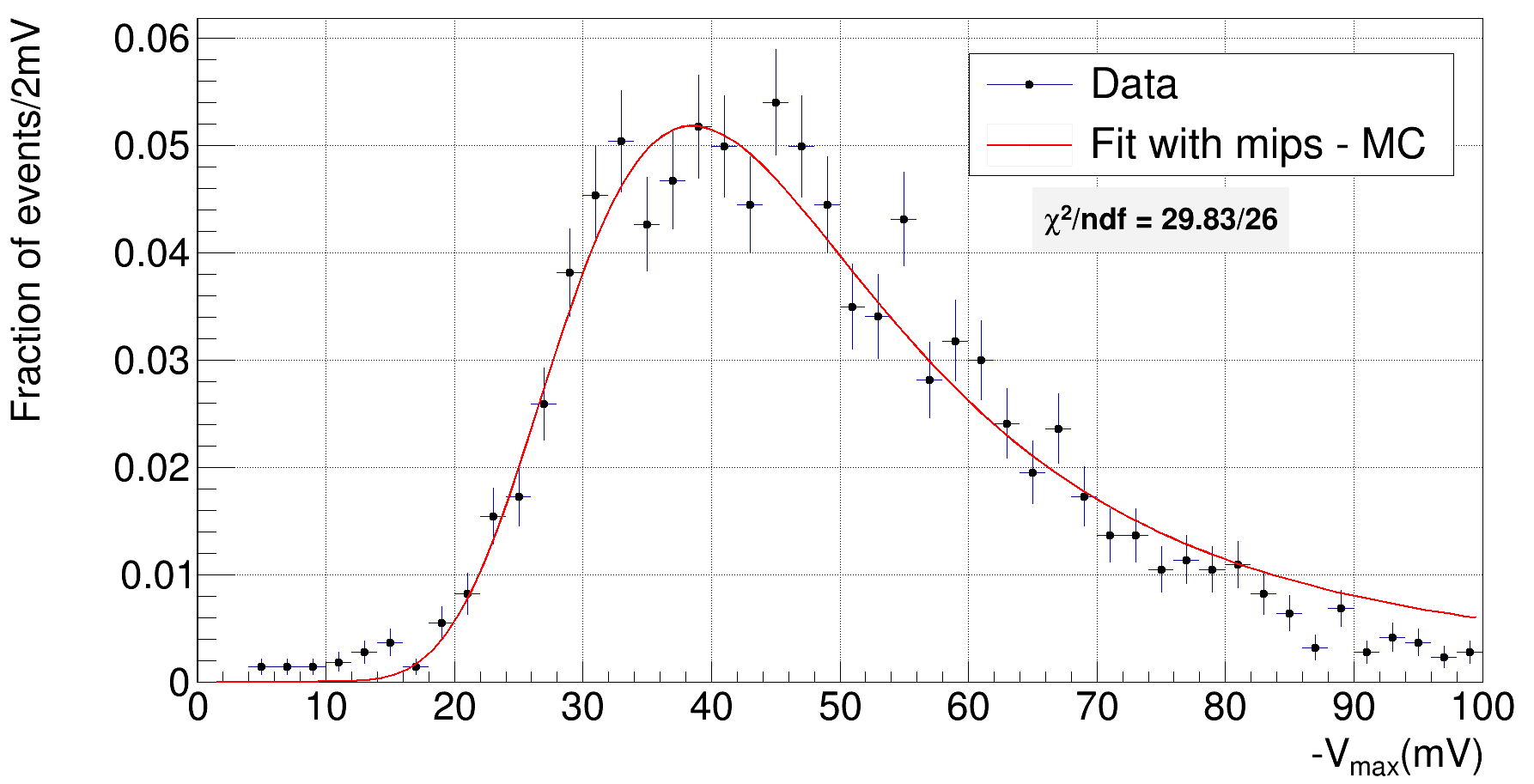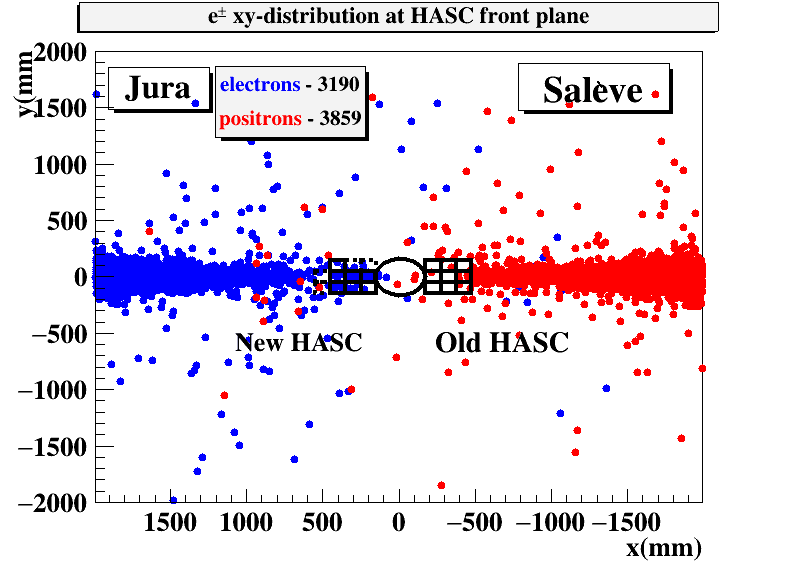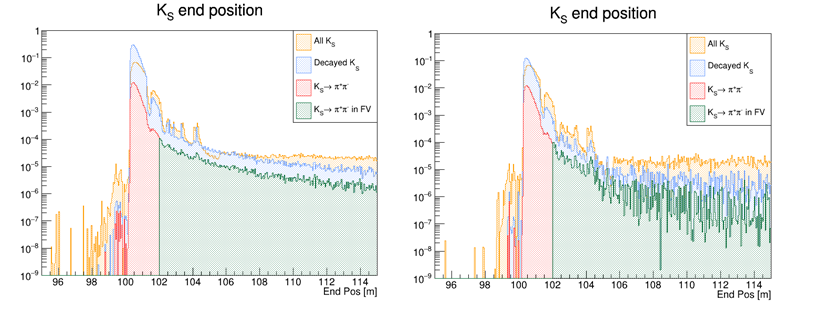NA62
objectives
The NA62
experiment aims to measure the very rare kaon decay K+
→ π+ν ν
at the CERN SPS , to
make a decisive
test of the Standard Model (SM) by extracting, through a 10%
measurement, the Cabibbo–Kobayashi–Maskawa (CKM) parameter |Vtd|.
In order to reach its main goal, NA62
needs to collect about 100 in-flight K+
→ π+ν ν events, and to keep the
total systematic uncertainty small. Assuming a 10% signal acceptance
and a branching ratio of 10-10, at least 1013
K+ decays are required.
To
keep the systematic uncertainty small requires a rejection factor,
for generic kaon decays, in the order of 1012 and the
possibility to measure efficiencies and background suppression
factors directly from data.
In addition to the main objective, the NA62 experimental setup will
offer the chance to perform many measurements on rare and
medium-rare kaon decays. In particular, the good energy resolution
for photons will allow the study the radiative kaon decays with
unprecedented precision.
Project
objectives
During the project (03.2020 - 12.2021), the Horia Hulubei National Institute of Physics and Nuclear
Engineering (IFIN-HH) team will contribute in:
- Upgrade of the Hadron Sampling Calorimeter (HASC), doubling its geometrical
acceptance;
- Improve the current HASC time resolution;
- Evaluation of NA62 sensitivity to various dark scalar decay channels;
- Maintain and operate HASC during NA62 Phyics Runs, dry-runs, beam
and cosmic rays tests;
- Participate at NA62 shifts during NA62Physics Runs, dry-runs, beam
and cosmic rays tests.
- Implementation of various biasing schemes in the NA62 Monte
Carlo framework
IFIN-HH
Team
The team is composed by the following R&D personnel from
IFIN-HH Particle Physics Department:
- Dr. Alexandru-Mario BRAGADIREANU - research scientist;
- Ovidiu-Emanuel HUTANU - electronics engineer;
- Stefan-Alexandru GHINESCU - physicist;
- Petre BOBOC - physicst;
- Neagu IONEL - technician;
- Alina Motorga - accountant;
Accomplishments
I. Assembly of the second Hadronic Sampling Calorimeter (HASC)
Activity I.1: Production, assembly and testing of HASC FEE and
mechanical supports for 18 HASC modules;
Activity I.2: Production, assembly and testing of HASC HV&LV
distribution and temperature controlloer.
II. Studies on HASC
Activity II.1: We elaborated a method for the calibration of the
HASC signal. The figure below shows the spectrum of amplitudes of the signals coming from cosmics rays
(in blue dots) and the fit (in red) using our model.
 Fig.1 - HASC signal calibaration with cosmics
Fig.1 - HASC signal calibaration with cosmics
Activity II.2: At the request of the collaboration, we performed
an MC simulation in order to determine the optimal placement of the new HASC station. The figure below
shows this position to be symetrical to the old station with respect to the beampipe.
 Fig.2 - Distribution of electrons (blue) and positrons (red) at the front plane of HASC
Fig.2 - Distribution of electrons (blue) and positrons (red) at the front plane of HASC
III. Implementation of variance reduction techniques
Activity III.1: We have modified the Geant4
K+
inelastic process to always emit a KS of momentum above 20 GeV/c, while
accounting for the probability (weight) of this to occur. The figure below shows the enhancement of
useful statistics (green) induced by this biasing technique
 Fig.3 - Decay Z position of KS in biased (left) and analog (right)
MC productions
Fig.3 - Decay Z position of KS in biased (left) and analog (right)
MC productions
Publications and talks
-
Searches for exotic decays with NA62
, PHENO 2020, Pittsburg USA, 5 May 2020;
-
Update on Dark Scalar/FastMC
, NA62 Exotics WG meeting, 3 April 2020;
-
Biasing in (exotic) MC
, NA62 Exotics WG meeting, 16 April 2020;
-
HASC studies
, NA62 Weekly meeting, 28 May 2020;
-
Bremsstrahlung biasing
, NA62 Exotics WG meeting, 15 July 2020;
-
Status of ALP →γγ
, NA62 Exotics WG meeting, 2 September 2020;
-
Search for di-gamma in beam-dump mode - update
, NA62 Exotics WG meeting, 22 October 2020;
-
HASC upgrade status
, NA62 weekly meeting, 14 January 2021;
-
Background in Beamdump from MC
, NA62 Exotics WG meeting, 4 February 2021;
-
HASC 2021 implementation
, NA62 Software WG meeting, 9 March 2021;
-
Beamdump background Data vs MC
, NA62 MC Validation WG meeting, 10 March 2021;
-
Background in beamdump
, NA62 Exotics WG meeting, 11 March 2021;
-
Update on beam-dump background
, NA62 Exotics WG meeting, 22 April 2021;
-
HASC Status
, NA62 Run meeting, 28 July 2021;
-
General update and ALP→γγ update
, NA62 Exotics WG meeting, 2 September 2021;
- Search for heavy neutral lepton production
in the K+decays to positrons
, NA62
Collaboration, Phys. Lett. B 807 (2020) 134499;
- An investigation of the very rare
K+→ π+ν νdecay
, NA62
Collaboration, JHEP 2020, 42 (2020);
- Search for K+ decays to a muon and invisible particles
, NA62
Collaboration, Phys. Lett. B 816, 136259 (2021);
- Measurement of the very rare K+→ π+ν νdecay
, NA62
Collaboration, J. High Energ. Phys. 2021, 93 (2021);
- Search for Lepton Number and Flavor Violation in K+ and π0 Decays
, NA62
Collaboration, Phys. Rev. Lett. 127, 131802 (2021);
- A biased MC for muon production for beam-dump experiments
, S. Ghinescu, B. Dobrich, E. Minucci, T. Spadaro, Eur. Phys. J. C 81, 767 (2021);


